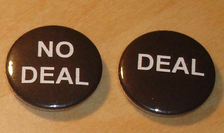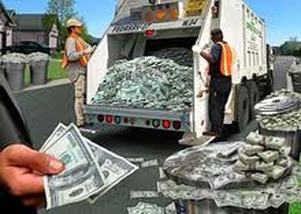
Freedomway.ca
Remember: Please share this article if you found it helpful!
Anyone who has ever become successful in reaching their dreams has always had a series or roadblocks to overcome.
Whether you are a Real Estate investor who has dreams of building an empire, a Entrepreneur with the next great idea or an Artist with the next great vision, we all have a series of challenges to face before we can become successful.
One common challenge that everyone has to face when chasing our dreams is that somewhere along the way, we require capital.
This is true for absolutely everyone. Whether you are the Real Estate investor requiring capital for buildings, the Entrepreneur requiring capital for a venture or the Artist requiring capital for an Art-form. The requirement is universal and every business/successful person requires funding at some point in his or her path to success.
Unfortunately for many people, raising capital is a "black box of voodoo" that many do not understand. Some of us are held back by limiting beliefs that "we do not deserve" to have capital or that we need to be born with it to be successful.
Nothing could be further from the truth.
Raising capital is a science and an art form. It obeys the law of certainty much like everything else in this world.
If certain things are done in certain ways, certain results are certain to occur.
With that being said, here are 5 Secrets to Raising Capital shared with me by the very-successful capital-raiser JT Foxx:
- Dress to impress: We only have one chance at making a first impression. The timeframe for establishing a good impression is a very short window between 3 and 30 seconds. As social animals, we are constantly looking for reasons NOT to do business with other people and we will scrutinize every minor detail to disqualify a newcomer. Some key details for dress are: the quality of suit, polished shoes, quality of business cards. Anyone who is idealistic enough to think that these things don't count is delusional. Even legends like Steve Jobs, Richard Branson and Hugh Hefner had to wear suits early in their careers. Dressing to impress is an easy way to ensure success.
- Pay attention to your branding: Effective branding is extremely important for anyone who wants to raise capital. However, branding is so much more than just a name, a colour and a logo. Branding is a feeling and an emotion surrounded by you and your company. What feeling does an audience get from you? Some easy ways to find out if you have effective branding or not are; Do you show up effectively in Google? Do you have pictures of yourself with successful people? Branding is what separates the top from the bottom in any business and it ensures a potential investor that you are not a fly by night operation.
- Know your numbers and be conservative: If in doubt, always be conservative. The worst mistake so many people make is that we try make our deal look better than it really is. A savvy investor will always poke holes in your strategy and call you on a plan that is too optimistic. If you appear to be misrepresenting something then you will scare away your investor and their money. Provide a "best case", "realistic case", "worst case" and "nightmare case" scenario. If your investor is ok with the "nightmare case", then you know that you have a deal.
- Back end is more important than the front end: Congratulations! You raised the Capital! Now what...? In a perfect world, raising the Capital is easy. What is much more important, however, is how you manage the "back end" of the deal. How good are you at "taking care" of the investor's money? Savvy investors are very hesitant to part with their money and you need to show them some accurate monthly reports with precise information. One of the worst things you can say to an investor is "I run the business and I do my own books." Investors want to see audited financials by a certified account. If you can provide this information you show that you are a professional, understand what they need to feel secure and have built a competent team.
- Make it about more than the numbers: Relationships are always the most important thing in business. When you pitch a deal or yourself based on the numbers, you are selling yourself short. If you are placing all of your value on the numbers alone, you are in big trouble. Don't be known as "the 12% guy", because later when the "13% guy" comes along, you will be finished. Instead, focus your presentation on your relationships, philosophy and results. Sell the vision of the big picture to your investors and have strong, realistic numbers. If you can provide all of the above, then investors will be calling you looking for a good place to put their money.
Raising capital is a skill that very few people have mastered. It's a skill that revolves around sales, marketing, branding, relationships and understanding the numbers. If you can focus on the 5 fundamentals above, then raising the capital required to build your dream will always be easily found.
Thanks for reading,
Stefan Aarnio
Freedomway.ca
P.S. Please share this article if you found it helpful!





 RSS Feed
RSS Feed

